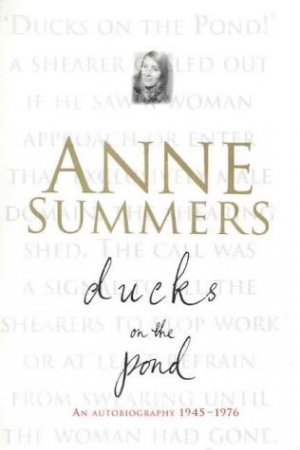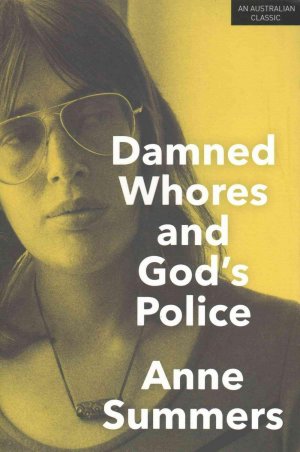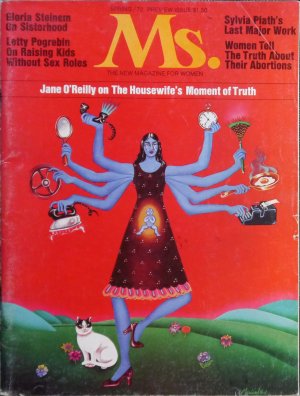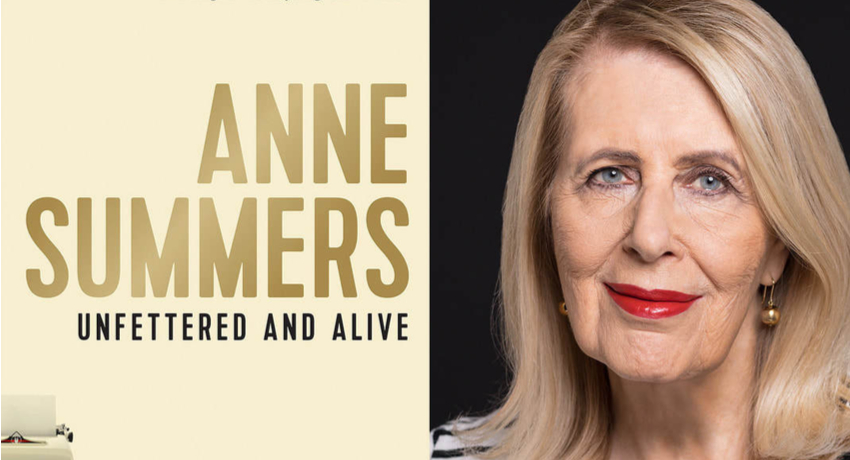Anne Summers has been out in front as long as any of us can remember, tackling the big issues of our time. She has covered so much ground it has been hard to keep up, so it’s a boon to have this new memoir, filling in some of the detail.
 Her previous memoir, Ducks on the Pond, covered her early years in the Australian women’s movement and events such as the founding of Elsie, Australia’s first feminist women’s refuge. Unfettered and Alive takes up the story from the end of 1975. She is no longer being arrested for direct action as happened in the battle for Victoria Street (It’s sometimes forgotten her first book was the Little Green Book, co-authored with Wendy Bacon). By the end of 1975 she has joined the National Times, and by the next year has earned a Walkley Award for a ground-breaking series of articles on NSW prisons. After time in the US on a World Press Institute scholarship, she returns to Canberra to be political correspondent for the Australian Financial Review. She was now a senior member of the Press Gallery and elected in 1983 as its first woman President.
Her previous memoir, Ducks on the Pond, covered her early years in the Australian women’s movement and events such as the founding of Elsie, Australia’s first feminist women’s refuge. Unfettered and Alive takes up the story from the end of 1975. She is no longer being arrested for direct action as happened in the battle for Victoria Street (It’s sometimes forgotten her first book was the Little Green Book, co-authored with Wendy Bacon). By the end of 1975 she has joined the National Times, and by the next year has earned a Walkley Award for a ground-breaking series of articles on NSW prisons. After time in the US on a World Press Institute scholarship, she returns to Canberra to be political correspondent for the Australian Financial Review. She was now a senior member of the Press Gallery and elected in 1983 as its first woman President.
The world of politics and political reporting was still very male-dominated however. Characters such as Bill Hayden reappear – as Minister for Social Security in the Whitlam government he had provided Cabinet-level support for Elsie, despite initial suspicion and a refuge worker closing the door in his face when he made an unexpected visit. In the new volume, when Hayden is Labor Opposition Leader and supposedly reforming the party, he opens a press conference with a rape joke and Summers walks out, despite the efforts of Allen Ramsay to smooth over his boss’s behaviour.
When Summers and Michelle Grattan tried to cover Prime Minister Malcolm Fraser’s St Patrick’s Day address in Brisbane the Irish Club would not admit women so they stood outside, giving radio interviews on sexism
When Summers and Michelle Grattan tried to cover Prime Minister Malcolm Fraser’s St Patrick’s Day address in Brisbane the Irish Club would not admit women so they stood outside, giving radio interviews on sexism. Both women went to Africa to cover CHOGM in 1979 and there is reference to their dancing with ZANU guerrillas in a series of Lusaka nightspots on the last night (no photo unfortunately). Summers had gone to Africa a few weeks early, to cover the apartheid regime in South Africa. The notebooks with her interviews with anti-apartheid activists then mysteriously became ‘lost luggage’, as her chilling South African experience followed her home.
Meanwhile, Summers’ pioneering feminist history of Australia, Damned Whores and God’s Police, had been published before the end of International Women’s Year in 1975. It became an enduring best seller – the latest edition published

in 2016. It also earned her a PhD from the Department of Government at the University of Sydney. She generously acknowledged the help of her supervisor, Professor Henry Mayer; in turn, Mayer’s widow later described how exposure to these new ideas convinced him he should do the dishes, which he did for the rest of his life.
In 1983 Summers moved to a new career as Head of the Office of the Status of Women in the Department of Prime Minister and Cabinet. She had been unsuccessful as an applicant for the job of Gough Whitlam’s Women’s Adviser in 1973 and later a radical critic of Elizabeth Reid, the successful applicant. Now she in turn was juggling the roles of missionary and mandarin, including an embarrassing start when she was arrested for refusing a breath test after a dinner with two women she was considering hiring as deputies.
Of help to Summers in her new role were the machinery of government commitments designed by a former head of the Office, Sara Dowse, and included in Labor’s women’s policy. Cabinet submissions had to be accompanied by an impact on women statement and there was a Permanent Heads Task Force on the Status of Women. This high-level body made possible the introduction of one of Summers’ lasting contributions – a pioneering model of what was later known as ‘gender budgeting’.
Gender budgeting requires recognition that both tax and spending decisions are likely to have a different impact on men and women. It requires portfolio analysis of what these impacts are likely to be, to forestall the inadvertent widening of gender gaps. Summers’ innovation became a best practice model of how to do gender mainstreaming, promoted by the UN and the OECD and adopted by countries around the world.
While in government, Summers also saw through the passage of the Sex Discrimination Act, preparatory work for the Affirmative Action Act and gained new recognition of childcare as an economic issue. She faced ferocious opposition from Finance Minister Senator Peter Walsh over childcare – supposedly ‘middle-class welfare’. Walsh was also denying funding for the Affirmative Action Agency at the time she decided to leave the bureaucratic battles behind and move to New York in 1986 as Fairfax’s North American manager.
…a bigger story was just around the corner – summed up in the headline: ‘Crocodile Dundee to edit Ms.’
Among the stories she filed from New York was one about Malcolm Fraser losing his trousers in a motel in Memphis, but a bigger story was just around the corner – summed up in the headline: ‘Crocodile Dundee to edit Ms.’ Ms. was the iconic feminist magazine created by Gloria Steinem. Remarkably for a feminist journal it had a circulation of about half a million copies, but by 1987 it was in serious financial trouble. Sandra Yates, who was in New York to create ‘Sassy’, a new teenage magazine for Fairfax, persuaded Summers that Fairfax should buy Ms. as well and Summers should become Editor-in-chief. After some hiccups this happened, only to be followed by the disintegration of Fairfax, thanks to Warwick Fairfax’s ill-fated takeover bid, and his decision to sell off the US magazines.

The preview issue of Ms. Spring 1972
Then came another extraordinary episode in Summers’ extraordinary life – she and Yates established a corporation called Matilda Publications and went onto Wall St to raise the millions of dollars needed to buy out the magazines. The chapter ‘Media Mogulettes in New York City’ tells the story of this success, swiftly followed by lethal encounters with American advertisers boycotting Sassy at the instigation of religious right groups and set on determining the editorial environment surrounding their ads in Ms.
The cash flow problems meant that despite desperate attempts at refinancing, Matilda Publications lost the magazines and Summers was fired by the new owner in December 1989. There was also hurtful denigration of her editorship by Steinam and Robin Morgan, who edited the new non-glossy, advertiser-free (and smaller-circulation) version of the magazine. One very positive outcome of the Ms. experience was Chip Rolley, the young American in the marketing department who became Summers’ partner from then on and, among other things, a director of the Sydney Writers’ Festival.
The next big episode started with a call to come back to Canberra as Prime Minister Paul Keating’s women’s adviser and help him with his ‘woman problem’– the gender gap in voter approval
The next big episode started with a call to come back to Canberra as Prime Minister Paul Keating’s women’s adviser and help him with his ‘woman problem’– the gender gap in voter approval. For eleven months she was part of the team that delivered Keating’s unexpected election victory in 1993. She commissioned focus group research with the women of ‘middle Australia’, which showed their overwhelming concerns were childcare, women’s health and violence against women. The immediate task was to get Keating to talk about things other than the economy and then to work out big responses to these issues.
One thing that proved unexpectedly difficult was to get women to give Keating personal accounts, so he would understand domestic violence. When a visit to a Perth refuge was finally set up, the women didn’t want to spoil their meeting with the Prime Minister by telling their painful stories. Nonetheless, when Keating launched the National Agenda for Women there were cheers when he said he was ‘shocked’ at Judge Bollen’s remarks concerning rape in marriage and wild applause when he said (and repeated), ‘It’s back to school for judges and magistrates’.
Another important commitment was to the Australian Longitudinal Study of Women’s Health, while the big childcare commitment went into Keating’s economic policy launch. When the unwinnable election was won, Keating was prompted by Summers to give ‘an extra special vote of thanks for the women of Australia who voted for us’.
Leaving government again, Summers returned to Fairfax as Editor of Good Weekend, with its one million readers. While in this job there was another setback – a widely-circulated rumour that she was to be the subject of a sexual harassment complaint by a male photographer. Summers is very frank about her pain over this and doubtless it enabled her to identify very closely with the experiences of other women in public life.
By early 1997 Summers had had enough of staff hostility at Good Weekend and departed for the next major episode in her life story. This was chairing the Board of Greenpeace International, yet another leap in the dark but one which left her an enormous admirer of the dedication and skills of those involved. She illustrates these with an account of anti-logging action in northern Brazil, the first Greenpeace action at which she was present and which involved high drama as well as leading to a good outcome for the local people and for the rainforest.
There was continuing engagement with what Prime Minister John Howard was doing to women’s policy and Summers detailed this in The End of Equality in 2003. In 2011 she appeared on an Australian postage stamp as an Australian Legend, along with three other feminists, including Germaine Greer. However, Summers had now finished with Greenpeace and miscellaneous corporate work and her book The Lost Mother had been published. At 66, a new chapter was about to begin.
Julia Gillard was Prime Minister and Summers was soon writing regularly again for the Sydney Morning Herald and giving numerous speeches, including ‘Her rights at work: The political persecution of Australia’s first female Prime Minister’. This detailed for the first time the obscene vilification of Gillard that was occurring on social media and the Pickering cartoons of her wearing a massive dildo that were being emailed to federal parliamentarians. Five weeks later, on 9 October 2012, Gillard gave her Misogyny speech, which instantly went viral. In turn, Summers’ speech was picked up internationally, bringing 200,000 visitors to her website by the end of the year. In 2013, just before Gillard lost the prime ministership, Summers published The Misogyny Factor, expanding on her recent speeches. The book tour drew huge crowds in grief over the fate of Australia’s first woman PM.

Meanwhile Summers had started yet another enterprise – as editor and publisher of the Anne Summers Reports. She received advice that the way to engage readers was to stage events. Julia Gillard had already appeared on the cover of ASR in front of a blackboard list of the reforms achieved as PM. The next step was to persuade her to appear at the Sydney Opera House and then Melbourne Town Hall ‘in conversation’. The conversation would continue what Gillard said about the relevance of gender when she lost the prime ministership, and be her first public appearance since then.
The tickets for the Gillard events sold out on the first day and a further 400,000 people watched the live broadcast on the ABC and more again when it was rebroadcast on radio. Constant interruptions of applause meant that Summers didn’t get to the tough questions at the Opera House and she was criticised for being soft on Gillard. But she asked the tough questions early in Melbourne and all in all both events were a triumph.
“I know that I am not finished and never will be”
The triumph with Gillard was followed by others, often directly relevant to the equality project, but digital advertising for the ASR proved elusive and she eventually closed it down in 2016. This is the last episode in this volume, but as she says in the final sentence “I know that I am not finished and never will be”.
Like Ducks on the Pond this is a wonderful read. I have focused on Summers’ public life, because there is so much to say about someone so centrally engaged with the Australian equality project for so long.
But both volumes also tell us much about family relationships and the role of friends and enemies over a lifetime. Summers is known for her personal warmth and its practical expression, whether helping put back the furniture when everybody was exhausted at the end of the Women’s Tax Summit, giving Women’s Electoral Lobby its first electric typewriter or knitting a pink pussy hat for Virginia Haussegger to wear on International Women’s Day.
The Australian women’s movement has been blessed by her presence, her energy and her political insight and we all benefit from her ability to write the story of her times so well.

The Pussyhat is an international symbol of protest, participation and solidarity. Anne Summers knitted this hat as a gift to Virginia Haussegger AM, Director 50/50 by 2030 Foundation. Image: https://www.nma.gov.au/exhibitions/australian-of-the-year-2019/virginia-haussegger




